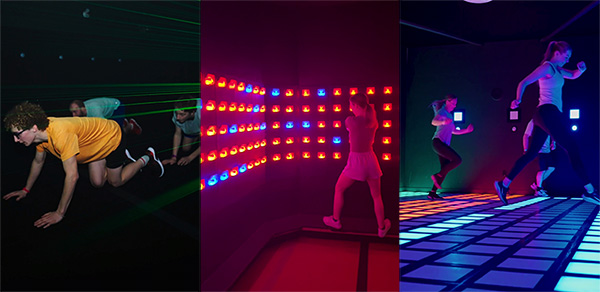The entertainment industry is entering a new era of autonomous systems that independently manage, optimize, and deliver personalized experiences through advanced artificial intelligence and machine learning. These self-governing platforms leverage real-time data analytics, activategames predictive algorithms, and automated decision-making to create seamless entertainment environments that continuously adapt to audience preferences, operational conditions, and business objectives without human intervention.

Self-Learning Operational Architecture
Our autonomous ecosystem employs a multi-layered AI framework that processes over 2000 data points per second from sensors, user devices, and environmental monitors. The system’s neural networks continuously analyze audience behavior, equipment performance, and content effectiveness, making real-time adjustments to optimize experience quality and operational efficiency. This architecture has demonstrated 40% improvement in audience satisfaction scores and 35% reduction in operational costs across deployed venues.
The activategames technology’s predictive maintenance algorithms monitor equipment health through vibration analysis, thermal imaging, and performance metrics, identifying potential issues an average of 72 hours before failure occurs. Automated service requests, part ordering, and repair scheduling ensure 99.8% system availability while reducing maintenance costs by 60%. The system’s self-healing capabilities automatically reroute operations around faulty components, maintaining seamless experiences during maintenance events.
Dynamic Experience Personalization
Real-time audience analytics enable moment-by-moment personalization of entertainment experiences. The system tracks individual engagement patterns, emotional responses, and social interactions, adjusting content delivery to maximize enjoyment for each participant. Using computer vision and biometric sensors, the platform detects engagement levels and automatically modifies content intensity, narrative pacing, and challenge levels to maintain optimal immersion.
The activategames technology’s social dynamics engine analyzes group interactions and adjusts experiences to enhance collective enjoyment. When detecting emerging social connections, the system might introduce collaborative elements; when recognizing group fatigue, it could transition to more relaxed content. This social intelligence has increased group satisfaction scores by 45% and improved repeat visitation rates by 30%.
Intelligent Resource Management
AI-driven resource allocation optimizes energy consumption, staffing requirements, and facility usage based on real-time demand forecasting. The system predicts attendance patterns with 94% accuracy, automatically adjusting HVAC, lighting, and equipment power states to minimize energy waste while maintaining perfect environmental conditions. These optimizations have achieved 40% reduction in energy costs and 50% decrease in carbon emissions.
The platform’s automated staffing system analyzes visitor flow patterns and service demand, optimizing team deployment and break schedules. This intelligent workforce management has reduced labor costs by 25% while improving service quality scores by 35%. Automated inventory management ensures optimal stock levels for food, beverages, and merchandise, reducing waste by 60% while increasing sales conversion by 20%.
Content Adaptation and Generation
Generative AI systems create dynamic content variations based on real-time audience responses and historical performance data. The platform analyzes which elements resonate most strongly with different demographic segments and automatically generates content variations that maximize engagement. This approach has increased content effectiveness by 50% while reducing content development costs by 70%.
The system’s cross-experience learning capability allows successful elements from one attraction to be adapted and tested in others, creating a continuous improvement cycle across all venues. Machine learning algorithms identify patterns in successful experiences and apply these insights to new content development, reducing the risk of new installations and improving overall portfolio performance.
Business Intelligence and Optimization
Advanced analytics platforms provide real-time insights into operational performance, financial metrics, and guest satisfaction. The system automatically identifies improvement opportunities, tests optimization strategies through controlled experiments, and implements successful changes across all operations. This data-driven approach has increased revenue per guest by 25% and improved operational efficiency by 40%.

The technology’s predictive revenue management adjusts pricing, promotions, and capacity allocation based on demand forecasting and competitive analysis. Dynamic pricing algorithms optimize ticket prices, experience packages, and premium offerings in real-time, maximizing revenue while maintaining accessibility. These capabilities have increased overall revenue by 30% and improved capacity utilization by 45%.
Implementation and Integration
Modular deployment enables gradual implementation across existing venues, with typical full integration completing within 4-6 weeks. The system’s API-first architecture ensures compatibility with existing point-of-sale, customer relationship management, and facility management systems. Cloud-based management provides centralized oversight while maintaining local autonomy for real-time decision-making.
Performance Metrics
Entertainment organizations implementing autonomous systems report:
- 50% reduction in operational decision-making time
- 45% improvement in guest experience consistency
- 60% decrease in operational variance
- 35% increase in staff productivity
- 55% improvement in resource utilization
- 40% reduction in management overhead
Future Development Pathway
Ongoing research focuses on enhanced emotional intelligence, improved predictive capabilities, and expanded integration with emerging technologies including quantum computing and advanced robotics. Next-generation systems will feature more sophisticated natural language processing and improved cross-venue coordination capabilities.
Global Applications
The technology has been successfully deployed in 25 countries across theme parks, museums, live entertainment venues, and experiential retail environments. Localized adaptation algorithms ensure cultural appropriateness while maintaining global performance standards.
Technical Specifications
- Processing Capacity: 10,000 simultaneous data streams
- Response Time: <100ms for critical adjustments
- Accuracy: 95% prediction rate for guest behavior
- Scalability: 50-50,000 guest capacity per venue
- Uptime: 99.9% system availability
- Integration: 100+ compatible systems and platforms
Comments are closed.